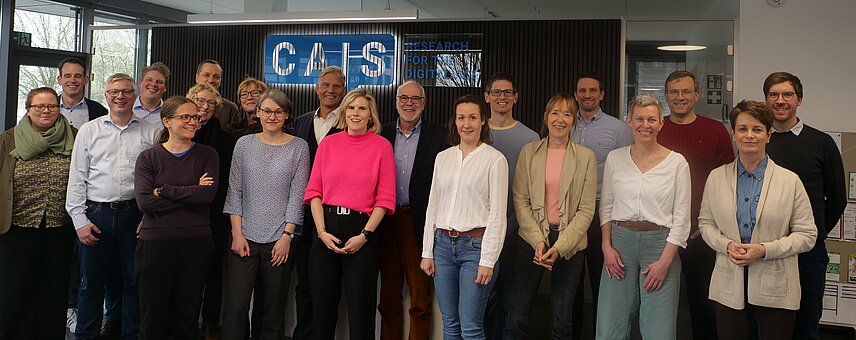18.07.2024
How should the responsible and sustainable use of artificial intelligence be organised in schools, universities and further education? The task force ‘Artificial Intelligence in Education’, in which a scientist from RC Trust is also involved, has been working on this issue.

Prof Emmanuel Müller, director of RC Trust and professor at the Faculty of Computer Science at TU Dortmund University, was involved in the task force with other colleagues from the Lamarr Institute in Bonn as an AI researcher and developer of future AI systems. He emphasised the importance of strengthening AI education beyond universities!
Different challenges in schools, universities and adult education
The recommendation paper includes proposals for state policy measures for the responsible integration of AI in schools, universities and further education. Among other things, the state government should establish and promote a ‘AI in education’ competence network that integrates the scientific expertise available in NRW and institutionalises dialogue and cooperation between research, educational practice, education policy and education administration.
For the school sector, the task force recommends, among other things, supporting further training through new science-based formats in which basic AI knowledge is taught, teaching materials are provided and further qualifications are offered for teachers, subject leaders and digitalisation officers. The task force also proposes developing and testing examination formats for the AI-supported assessment of learning achievements and competences.
For the higher education sector, the experts recommend expanding training programmes in the field of AI, especially for university didactics, as well as developing prototypes of digital learning environments. In addition, joint access options for AI systems should be provided, including for selected commercial applications, preferably as part of state solutions. An open source infrastructure is to be established by pooling expertise.
The heterogeneity of learners and teachers poses major challenges in adult education. The task force therefore recommends identifying the specific needs of the respective target groups in order to develop and implement appropriately customised further training for learners and further training for teachers. In addition, further education institutions should be equipped with modern digital infrastructure.
Ina Brandes, Science Minister of North Rhine-Westphalia, said at the award ceremony in Düsseldorf: ‘I am certain that AI will help us in many areas to make people's lives more pleasant and better - including with new, efficient teaching and learning methods.At the same time, the rapid development of AI is accompanied by ethical challenges.This is another reason why we as the state of North Rhine-Westphalia are investing in AI research in order to create a counterweight to the large American corporations, for whom ethical considerations are not a priority.’
Prof. Emmanuel Müller, our director, emphasised the importance of strengthening AI education beyond universities: ‘For trustworthy artificial intelligence made in NRW, we not only need numerous AI experts from NRW universities and NRW research institutes, but also broad education and training in schools and companies in order to be able to question and discuss artificial intelligence across the breadth of society.’
JProf. Eva Schmidt from the Institute of Philosophy and Political Science at TU Dortmund University was also involved in the task force. She emphasised: ‘When developing the recommendation paper, it was particularly important to me to incorporate philosophical and ethical aspects.This is because we must also ensure that aspects such as the trustworthiness and fairness of AI systems are taken into account in an educational context. We also need to think about the morally relevant effects of using such systems.
About the task force
The task force is made up of academics from the educational and social sciences and computer science, representatives from the relevant state ministries, the state administration and educational practitioners.Its members also include the Lamarr Institute for Machine Learning and Artificial Intelligence and us, the Research Centre Trustworthy Data Science and Security.
Here is the link to the recommendation paper.
Category
- Publication
- Event